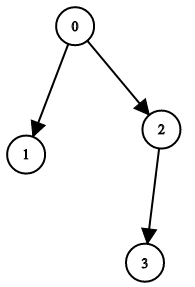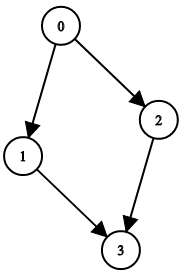You have n binary tree nodes numbered from 0 to n - 1 where node i has two children leftChild[i] and rightChild[i], return true if and only if all the given nodes form exactly one valid binary tree.
If node i has no left child then leftChild[i] will equal -1, similarly for the right child.
Note that the nodes have no values and that we only use the node numbers in this problem.
Input: n = 4, leftChild = [1,-1,3,-1], rightChild = [2,-1,-1,-1] Output: true
Input: n = 4, leftChild = [1,-1,3,-1], rightChild = [2,3,-1,-1] Output: false
Input: n = 2, leftChild = [1,0], rightChild = [-1,-1] Output: false
n == leftChild.length == rightChild.length1 <= n <= 104-1 <= leftChild[i], rightChild[i] <= n - 1
use std::collections::HashSet;
impl Solution {
pub fn validate_binary_tree_nodes(n: i32, left_child: Vec<i32>, right_child: Vec<i32>) -> bool {
let mut candidates = (0..n).collect::<HashSet<_>>();
let mut stack = vec![];
let mut visited = HashSet::new();
for i in 0..left_child.len() {
if left_child[i] >= 0 && !candidates.remove(&left_child[i]) {
return false;
}
if right_child[i] >= 0 && !candidates.remove(&right_child[i]) {
return false;
}
}
if candidates.len() != 1 {
return false;
}
stack.push(candidates.into_iter().next().unwrap() as usize);
visited.insert(stack[0]);
while let Some(i) = stack.pop() {
if left_child[i] >= 0 {
if visited.insert(left_child[i] as usize) {
stack.push(left_child[i] as usize);
} else {
return false;
}
}
if right_child[i] >= 0 {
if visited.insert(right_child[i] as usize) {
stack.push(right_child[i] as usize);
} else {
return false;
}
}
}
visited.len() == n as usize
}
}

